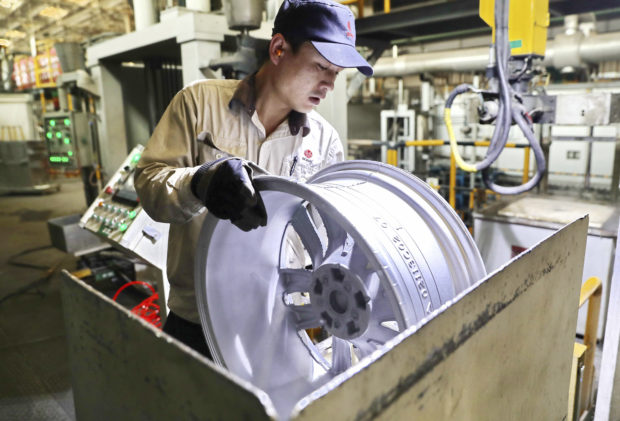US, China envoys hold last trade talks before March 1 deadline

In this Monday, Feb. 11, 2019, photo, a laborer works on an aluminum wheel hub at a manufacturing facility in Qinhuangdao in northern China’s Hebei province. U.S. and Chinese negotiators meet this week for their final trade talks before President Donald Trump decides whether to go ahead with a March 2 tariff hike on $200 billion of imports from China. (Chinatopix via AP)
BEIJING — U.S. and Chinese negotiators meet this week for their final trade talks before President Donald Trump decides whether to go ahead with a March 2 tariff hike on $200 billion of imports from China.
Two days of talks starting Thursday are too little time to resolve a tariff war over Beijing’s technology ambitions that threatens to drag on weakening global economic growth, say business people and economists. Instead, they say China’s goal is to show they are making enough progress to persuade Trump to extend his deadline.
There are few signs of progress on their thorniest issue: Washington’s demand that Beijing scale back plans for government-led creation of global champions in robotics and other technology. China’s trading partners say those violate its market-opening obligations. Some American officials worry they might erode U.S. industrial leadership.
This week, Beijing wants “to see the threat of additional tariff imposition being removed for as long as possible,” with minimal conditions attached, said Louis Kuijs of Oxford Economics.
Trump’s December agreement to postpone more tariff hikes while the two sides negotiate expires March 1. The following day, a 10 percent tariff imposed in July on $200 billion of Chinese imports would rise to 25 percent.
Article continues after this advertisementCompanies on both sides have been battered by Washington’s tariffs and retaliatory duties imposed by Beijing. And the stakes are rising as global economic growth cools.
Article continues after this advertisementTrump hiked tariffs on Chinese goods in July over complaints Beijing steals or pressures companies to hand over technology. The dispute spread to include Chinese technology plans, cyberspying and their lopsided trade balance.
Chinese leaders have offered to narrow their multibillion-dollar trade surplus with the United States. But they have resisted making major changes in development plans they see as a path to prosperity and global influence.
“China will continue resisting U.S. demands in certain areas, such as changes to its industrial strategy and the role of the state in its economy,” said Eswar Prasad, a Cornell University economist who was head of the China division at the International Monetary Fund.
Chinese officials reject complaints that foreign companies are required to hand over technology. But business groups and foreign governments point to rules they say compel companies to share technology with state-owned local partners or disclose trade secrets.
Chinese officials also are balking at U.S. pressure to accept a mechanism to monitor whether Beijing carries out its promises, said Kuijs.
“They feel that it is humiliating for China if another country does this,” he said.
The U.S. delegation is led by Trade Representative Robert Lighthizer, who has said his priority is Chinese industrial policy, not the trade gap. He is accompanied by Treasury Secretary Steven Mnuchin.
The Chinese side by Vice Premier Liu He, President Xi Jinping’s top economic adviser. It will be his second meeting with Lighthizer following last month’s talks in Washington. /gsg